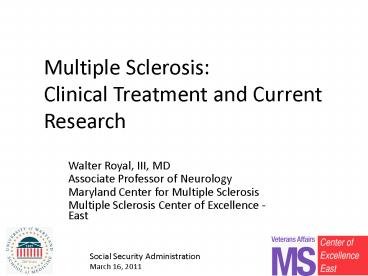Multiple Sclerosis: Clinical Treatment and Current Research - PowerPoint PPT Presentation
Title:
Multiple Sclerosis: Clinical Treatment and Current Research
Description:
... * Also associated with Graves Dis., IDDM and RA Treg = regulatory T cells Based on data from small number of DRB5*null African American subjects ... – PowerPoint PPT presentation
Number of Views:115
Avg rating:3.0/5.0
Title: Multiple Sclerosis: Clinical Treatment and Current Research
1
Multiple SclerosisClinical Treatment and
Current Research
- Walter Royal, III, MD
- Associate Professor of Neurology
- Maryland Center for Multiple Sclerosis
- Multiple Sclerosis Center of Excellence - East
Social Security AdministrationMarch 16, 2011
2
Presentation Outline
- MS Epidemiology, pathogenesis and clinical
features - General approaches to therapy
- Currently approved disease modifying therapies
- Symptomatic therapies
- Research underway at the Maryland Center for MS
3
Multiple Sclerosis Risk and Geography
Wallin MT et al. Ann Neurol 20045565-71.
4
MS is an Immune-Mediated Disease
BBBblood-brain barrier APCantigen-presenting
cell. Adapted from Miller et al. Continuum
Multiple Sclerosis (Part A). 199957.
5
The Immune Response in Multiple Sclerosis
6
Pathologic Features of Multiple Sclerosis
7
Gray Matter Lesions in MS
Amadio S et a. Cereb Cortex. 2010 Jun20(6)1263.
8
Multiple Sclerosis Clinical Subtypes
80 at diagnosis
50 of RR patients after 15 yrs
10-15 at diagnosis
Rare
Lublin FD et al. Neurology. 199646907-911.
9
Diagnosis of Multiple Sclerosis
- MRI
- Revised McDonald Criteria
- Incorporates previous criteria
- Address all MS types
- RRMS, SPMS
- Monosymptomatic
- Primary progressive
?
10
What Causes MS?
- Genetics
- Environmental
11
Major Gene Associations from GWAS Studies in MS
- Locus
- HLADRB11501
- IL-2RA (CD25)
- CD58 (LFA3)
- IL-7R (CD127)
- HLA-DRB5
- Chromosome (Function)
- 6p21.3 (antigen presentation)
- 10p15 (development of Treg cells)
- 1p13 (binds CD2 on T cells)
- 5p13 (T and B cell development)
- 6p21.3 (decreases risk of SPMS)
Also associated with Graves Dis., IDDM and RA
Treg regulatory T cells Based on data from
small number of DRB5null African American
subjects
12
Epstein Barr Virus
Ascherio A and Munger K. Ann Neurol
200761288299
13
Currently Available MS Drug Therapies
- Drug
- IFN-ß1b (Betaseron)
- IFN-ß1a (Avonex)
- Mitoxantrone (Novantrone)
- IFN-ß1a (Rebif)
- Natilizumab (Tysabri)
- IFN-ß1b (Extavia)
- Fingolimod (Gilenya)
- Approval Year
- 1993
- 1995
- 2000
- (2002 orphan drug act)
- 2005
- 2009
- 2010
14
Disease Modifying Therapies Injections
15
Humanized Monoclonal Antibody Therapies IV
Infusions
- Natalizumab (Tysabri)
- ?4 Integrin (T cells)
- Rituximab (Rituxin)
- CD20 (B) cells
- Alemtuzamab (Campath)
- CD52 (TB cells, monocytes)
- Daclizumab (Zenapax)
- CD25, CD40 ligand (T cells NK cells)
Not currently FDA approved
16
Mechanisms of Action of Injectable Drugs
- Interferons (IM, SC)
- Induction of Interferon-responsive genes
- Glatiramer acetate (SC)
- ? numbers of suppressor cell phenotypes
- Neuroprotection via BDNF induction (?)
- Monoclonal antibodies (IV)
- Physical interactions ? functional inhibition
- Oral agents
- Inhibition by small molecules
17
Impact of Approved MS Therapies on Annualized
Relapse Rate
18
What Works Best?
- High vs Low Dose IFN-?
- High dose was superior
- IFN-? Low Dose vs Double-dose x 2
- No difference
- IFN-? vs Glatiramer acetate
- No difference
- IFN-? vs Glatiramer acetate vs IFNGA
- Results pending
- Approved drug as comparator
- E.g., Natalizumab and fingolimod vs IFN-?
(natalizumab was superior)
19
More Aggressive Therapies in MS Efficacy at a
Price
- Higher dose IFN-ß ?Injection frequency ? side
effects (?) - Natalizumab PML
- Rituximab Rarer reports of PML
- Alemtuzamab ITP Graves disease
- S1P1 antagonists cardiopulmonary, infectious
- More potent immunomodulation ? increased risk of
malignancy?
20
Progressive MS
- No treatments available
- Recent, current and pending studies
- Fingolamod (FTY-720 PPMS)
- MIS416 (used for pathogen-specific immunization)
- Lipoic acid (neuroprotection)
- Simvastatin (SPMS)
- Mesenchymal stem cell transplantation
(autologous SPMS)
21
Treatment of MS Symptoms (New Agents)
- Fatigue Armodafinil (Nuvigil)
- Poor ambulation Dalfampridine (Ampyra)
- Pain
- Spasticity
- Pseudobulbar affect Dextromethorphan/Quinidine
sulfate (Nuedexta) - Psychological problems
- Urinary dysfunction
- Sexual dysfunction
- Cognitive impairment
22
Maryland Center for MS Active Clinical Drug
Studies
23
Maryland Center for MS Pending Clinical Drug
Studies
24
Other MS Research at the Maryland Center for
Multiple Sclerosis
- MS Biomarkers
- T cell markers (Naïve, memory T cells CXCR3)
- Genetic markers (Response Gene to Complement 32
RGC-32) - Vitamin D
- Cigarette smoke and MS
- Potassium channels and immune modulation
- Models of bone marrow transplantation therapy
- Neuroprotection
25
Maryland Center for Multiple Sclerosis
- Christopher Bever, MD
- Kenneth Johnson, MD
- Walter Royal, III, MD
- Horea Rus, MD
- Robert Shin, MD
- Kerry Naunton, RN
- Elizabeth Wheeler, RN
- Valerie Wells, BA
- Cynthia Dorsey































